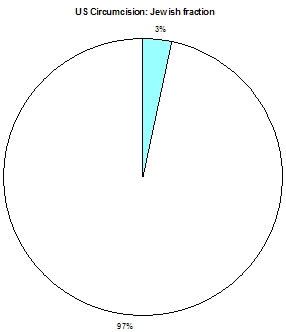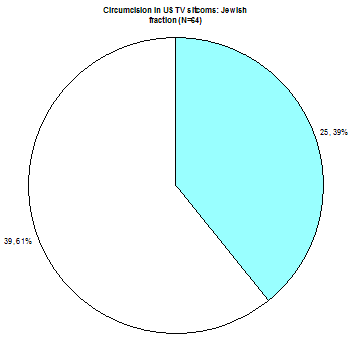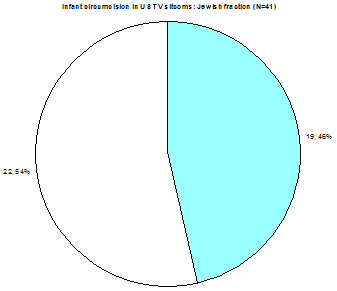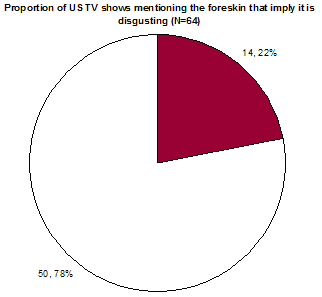Circumcision occupies a peculiar place in United States culture, being simultaneously ubiquitous, controversial, and a taboo topic of conversation. Thus, to refer to it on television can be simultaneously mundane and daring, a contradiction to which much television programming aspires. It is hardly surprising that references to circumcision maintain a high level of ambiguity: while people may argue about it, the outcome is almost invariably to promote it. 1. US TELEVISION SITCOMS It is almost inevitable that any US sitcom or soap-opera will sooner or later have an episode or a segment about circumcision. My database now contains 64 shows that say anything coherent about it.1
Those that have devoted a whole episode to circumcision include Dharma and Greg, Early Edition, ER, Friends, Judging Amy, Married with Children, The Nanny, Off Centre, Queer as Folk, Seinfeld, Sex and the City, South Park, Thirty-something, and Undressed. Others have introduced the topic as a subplot throughout an episode, and many more have had a scene about it or mentioned it in passing. (They were gathered by no particular means, so bias in selection is undetermined.) 1.1 Unease Speaking of circumcision in television sitcoms, Glick remarks that, whenever it is discussed, “it is reasonably safe to say” that “the defining motif is uneasiness.”2 The function of many of the references seems to be (perhaps unconsciously) to resolve that uneasiness, in nervous laughter, dismissal, or anger at anyone who would upset the status quo. Several themes recur:
All of these serve to promote infant circumcision. The paradox of themes 4 and 5 is easily resolved. Circumcision is controversial when anybody suggests not doing it, and circumcision is trivial when it's over. I will discuss only the first three themes in detail. 1.1.1 “Infant circumcision is inevitable” Genital integrity activist Ari Zighelboim saw this so clearly that he formulated it as a law: “If circumcision of a baby is discussed, baby will be circumcised.” Exceptions have occurred only recently. In Ladies' Man, Jimmy Stiles (Alfred Molina) apologizes to his newborn son that they will be going home to a house full of women (the “sit.” of this “com.”). A nurse comes in and holds out her arms for the baby. Jimmy unquestioningly hands his son over - and then, as an afterthought, as the nurse is leaving, asks where she is going. “To get him circumcised.” Without batting an eye, Jimmy says, “And so it begins.”3 A direct reference like that to the act of circumcising babies in hospital is rare. Routine infant circumcision (RIC) is so invisible that the medical soap, ER, and the film, Riding in Cars with Boys, both showed naked newborn babies who had, it seems, already been circumcised and healed instantly. In ER, he was brought in after being born in the street; in Riding in Cars, he was brought in for his parents to see for the first time, and their surprise was that he was male. 1.1.2 “Infant circumcision is Jewish.” The Jewish proportion of circumcision on television is much higher than in reality. Since Jews comprise 2% of the US population and, assuming 60% of gentile males are circumcised and all Jewish males are circumcised, a maximum 3.3% of circumcision in the US can actually be Jewish.4 The vast majority of the remainder are neonatal quasi-medical circumcisions and, as Glick points out, many of the Jewish babies are circumcised without ritual in hospitals, and an unknown number are not circumcised.5 
On television, the picture is rather different:  Of 64 references to circumcision in sitcoms, 25 (39%) were Jewish. When we consider only infant circumcision, the message is even stronger:  Of 41 references to infant circumcision in sitcoms, 19 (46%) were Jewish. Presenting the Oscar for special effects in 2006, Ben Stiller pretended to be using green-screen technology to appear as a floating head. His floppy all-over green garment hardly gave proof that Stiller is even male, but host Jon Stewart, said “It's good to have proof that Stiller's Jewish.” The near-truism “All Jewish men are circumcised” had become “Only Jewish men are circumcised” in a way whose absurdity would be self-evident in almost any other field. Why it would be “good to have proof” is not clear. In the context of circumcision and memetics, I said The two memes of Jewish circumcision and routine infant circumcision in the US are like the two members of a double star, orbiting each other and influencing each other while keeping their distance - with Jewish circumcision a visible, shining star, routine infant circumcision a black hole, sucking in parents and babies.6 This is very clear on television, and the two are virtually never mentioned or discussed together. 1.1.3 “The adult foreskin is disgusting” (Glick traces this view back to Mishnah Ned. 3.11, and the exact words of Rabbi Eliezer b. Azariah, which were a Jewish reaction to Christian polemic against circumcision, in the second and third century C.E.7) Fourteen out of 64 shows that referred to circumcision (22%) implied that the foreskin is disgusting.  But, this figure of 22% doesn't do justice to the depth of disgust. ·
The infant foreskin is seldom referred to. Stories based on infant circumcision seldom go anywhere near what happens to the baby, but focus on how his parents feel, usually on how they overcome their fears and go ahead with it. Exceptions to all these rules come from outside the US, or are influenced by non-US origins. The genital integrity movement has been treated at least once, in Arrested Development - about a dysfunctional family presided over by a woman who adopts every cause that's going. Unsurprisingly, the real issues are not touched on. Foreskin restoration is a recent and rare element, always presented as surgery. The non-surgical self-restoration movement is invisible so far. 1.2 IN MORE DETAIL: 1.2.1 Sex and the City In Sex and the City, the four upmarket, sexually savvy Manhattan woman friends compare their preference in penises.9 While one defends intactness (with some disregard for the actual anatomy) - “I love an uncircumcised dick. It's like a Tootsie-Pop: hard on the outside, with a delicious surprise inside” - the others are scornful: “I'm sorry, it is not normal.” “Well, actually it is, something like 85 percent of men aren't circumcised. “Great! Now they're taking over the world!” “Honey, it's a penis, not Godzilla.” - one comparing an intact penis to a Shar-Pei. The issue peaks with the latest man-friend of one of the women having himself circumcised because he has had so many bad reactions from women. The pain of the operation is not stinted (because he's an adult) and she likes the result (though at only a week out, it would actually be a bruised mess), but it's disastrous for their relationship - because circumcision has done his self-esteem so much good that he wants to try it out on other women. Though this is New York, there's no reference to Jewish circumcision, and hardly any to operating on babies: to all intents and purposes, a man's foreskin is a rare birth defect. 1.22 Seinfeld By contrast, Seinfeld, about four directionless friends, also in Manhattan, treats Jewish ritual circumcision without acknowledging the existence of any other kind.10 Jerry and Elaine have been chosen to be godparents of a Jewish baby. Remarkably, their neighbor openly opposes infant circumcision, because, he says, ·
He even momentarily holds on to the baby and tries to protect it, and he's rewarded for doing so by being made godfather in Seinfeld's place - after the circumcision is over. But the anomalous character is Kramer, who is a kook. In the same episode, he roams the hospital looking for hybrid pig-men, who (or which) he believes are being made there in Frankensteinian experiments, so we may safely discount anything he has to say. As Glick notes, the circumcision here is Jewish in name only.11 The mohel is a nincompoop who seems to know nothing about the religious role of circumcision. The only reasons given for doing it are: ·
The program makes no direct reference to American routine circumcision, though the gentile characters, George Constanza and Cosmo Kramer, are implicitly circumcised because, when they're asked about intact penises, they refer only to other people. It exhibits a blindness towards what circumcision entails that would be remarkable if it were not so common. As Glick points out, we hear the onlookers screaming, but not the baby.12 Jerry's finger is accidentally cut during the ceremony, and he later wails: “I've never had stitches. I'll be deformed. I can't live with that. It goes against my whole personality. It's not me.” If the scriptwriters planned any ironic reference to Seinfeld's own circumcision in this outburst, it will be too subtle for most people to spot. Glick remarks, “The inescapable message of this entire performance is that circumcision is perilous. …Nevertheless, …Jewish foreskins must be - and will be - removed.”13 I suggest that the purpose of all the nervous laughter around circumcision is to allay people's fears. We might very well call it “gallows humor.” 1.2.3 Dharma and Gregg Free-spirited Dharma and buttoned-down Gregg briefly adopt a boy, and it's mainly Dharma's hippie parents and Gregg's Jewish ones who discuss circumcision, in supposedly comical terms.14 Eventually they put him through a melange of birth customs, including a Jewish-style circumcision, then reluctantly give him back to his birth mother, at the same time showing her the video of the ceremony. Her only comment: “Who's that fainting?” Once it's done, circumcision is no big deal. 1.2.4 The Simpsons The most strikingly anti-circumcision message on US TV so far occurs, unsurprisingly, in the iconoclastic animated domestic comedy, The Simpsons.15 Krusty the Clown finds that he isn't on the Jewish clowns' Walk of Fame because he's never had a Bar Mitzvah, though he bitterly says he was circumcised… “and then some.” In his TV show, he regularly runs a cat and mouse cartoon, The Itchy and Scratchy Show, that emphasizes gratuitous violence. In this episode, called "A Briss before Dying", Scratchy (the cat) is about to circumcise Itchy (the mouse), in a Jewish setting and wearing a kippah. Scratchy even utters some words of Hebrew that can be recognized as a commonplace blessing, as before food. But as he holds up the knife, Itchy leaps up and pulls out Scratchy's eyes. Wildly swinging the knife, Scratchy cuts himself to pieces. Itchy puts them through a mincer, forms the mince onto a tube, pokes it into a fire and, as if it were glass, blows it into a goblet. He wraps the goblet in a napkin, steps on it and shouts “Mazel Tov!” - Congratulations! (a reference to the ceremony at a Jewish wedding). - all in 35 seconds. Krusty sums up “That's what I believe now.” It's a quite remarkable revenge fantasy, the likes of which we've never seen on flesh-and-blood TV. (It's also a rare episode of Itchy and Scratchy, in which the violence is self-defensive.) In light of the actual ratio, and the fact that Itchy and Scratchy have never before shown any sign of being Jewish, it's unexpected that the context is ritual and not surgical. The only reason for that is Krusty's need. In later episodes of The Simpsons, ·
The ambivalence of each reference is palpable. 1.2.5 South Park The other cartoon show that casts any doubt on the wonderfulness of circumcision is South Park, with the unequivocal, if not quite accurate, line, “Cuttin' off weewees ain't cool!” But, after the kids spend most of the episode trying to rescue little Ike from his Bris, he treats it so casually - saying “Ouch!” and walking away - they all decide to emulate him. South Park and Off Centre both joke about it being done with a huge pair of shears. 1.2.6 Off Centre In Off Centre, despite its nine instances of disgusting foreskin, Euan emerges with his penis still intact. (He's talked out of circumcision at literally the last second, by a nurse who chides him for his vanity so, even then, nobody actually defends intactness.) There are many negative references to adult circumcision, including the big shears, and a detailed description of a Gomco circumcision, including separation of the foreskin from the glans - obviously based on the infant operation. The only intended reference to neonatal circumcision is also negative but supposedly humorous. If there's a message, it's “Cut them early to save embarrassment later.” 1.2.7 Queer as Folk (US) A rare show that treats circumcision at all thoughtfully is the US version of Queer as Folk, a sitcom about some gay men, lesbians, and their friends. It's also remarkable in that a biological father, Brian, who is gay, succeeds in saving his son from his Bris, again, at literally the last second.16 Lindsay: Why does it matter to you if Gus is circumcised? Brian: It matters that he's been in this world less than a week and already there are people who won't accept him for the way he is. Who would even mutilate him rather than let him be the way he is. The way he was born. Well, I'm not going to let that happen. Though he even uses the m-word, intactness (“the way he is”) is a metaphor for gayness, the main theme of the series. Ludicrously, the biological mother did not know the bris involved circumcision until it was about to happen. It's her lesbian partner, Mel, who is Jewish, and the battle of the sexes takes center-stage. Lindsay: You know, there are a lot of men who think circumcision is a cruel and barbaric practice. Mel: I don't care what men think about their dicks! I care that you put Brian before me. While some remarkably anti-circumcision statements are made, much of the discussion - especially Mel's contribution - ignores any effect circumcision might have on the baby. In a later episode, a man goes to a gay Jewish function in order find a Jewish husband, and is then rejected at the last second because he's intact. Typically, he offers to convert and be circumcised, but it defies belief that he wouldn't know in advance that it might be an issue. 1.2.8 Married with Children Married with Children, never the smartest kid on the block, excels itself in an episode in which Al Bundy (Ed O'Neill) is accidentally circumcised in hospital by a doctor who confuses a “circular incision” with a circumcision.17 Incredibly, nobody suggests suing the doctor or the hospital. (There is a rare but trivializing reference to the pain of routine infant circumcision, in which Al is humiliated by being put into a ward full of crying babies.) Circumcision is trivial, beneficial (to Al's sex life - from being a synonym for male frigidity, he becomes briefly rampant) and a huge joke to his wife. It is painful, but the main disadvantage is the month's enforced celibacy. 1.2.9 E.R. An episode of the medical soap E.R. plays fast and loose with facts to make infant circumcision inevitable.18 A couple disagree about it at high volume in hospital corridors - the mother accusing the father of wanting his son to look like him (a reason often seriously offered when the father is circumcised, but here, when the father is intact, an unacceptable reason). She has the baby cut by another doctor who “likes the look.” No-one asks any questions about the medical ethics of this. The father intervenes - too late, and the circumcision has to be completed. 1.3 Self-Circumcision If the idea of circumcision makes viewers uneasy, the idea of doing it to oneself creates a double frisson. At least three shows have dealt with self-circumcision, in each case to please a girlfriend. An underlying message of this plotline is that circumcision is trivial: today a bouquet, tomorrow a foreskin. Men do circumcise themselves in real life, but more commonly for masochistic and/or fetishistic reasons, that is, for sexual pleasure from the operation itself and its contemplation. That is not the kind of theme with which US TV readily engages. 1.31 Nip/Tuck Nip/Tuck, about two cosmetic surgeons in partnership in Miami, revels in the gory details of facial and chest surgery. Several early episodes in the first series deal with the son of the idealistic doctor, convinced that his girlfriend doesn't like his foreskin and unable to persuade the cynical doctor to circumcise him, attempting to do it himself, using instructions he downloads by voice off the Internet. Unusually for this show, we see none of the details. The denouement is that he finds out the girlfriend is lesbian and his foreskin was just an excuse to get rid of him. The operation is completed surgically. If there's a message, it is “Don't try this at home; trust the experts, they know what to do.” 1.3.2 E.R. again In another episode of E.R., the self-circumcision is completed surgically, only to reveal that the woman didn't really mean it; she too wanted to be rid of the man and thought this would let him down lightly. 1.3.3 House M.D. In a rare exception to the general rule, Dr. House undoes a young man's attempt at self-circumcision - but with a typically inept euphemism, “putting the Twinkie back in the wrapper.” 2. GAME AND TALK SHOWS Being unscripted, these are an opportunity for common perceptions and misconceptions to be expressed. “Circumcision is Jewish” is one, “Circumcision is minor” another. “The foreskin is disgusting” is less likely to emerge, perhaps because the owner of one may be in a position to answer back but, when he is not, no holds are barred. Thus, Joan Rivers, in her eponymous show, could fall to the ground, look up a dancer's kilt and say, “Please, call a rabbi and have that thing taken care of. I'll pay for it!” (Note the extreme euphemism, “taken care of,” and that she refers to a rabbi, not a doctor.) 3. OUTSIDE THE U.S. The attitude on non-US shows is strikingly different. They rarely touch on the subject, but when they do, they are much less biased. For example, in one episode of the British sitcom Game On, ginger-haired agoraphobic Martin Henson (Matthew Cottle) is nervous about his penis in general, its freckles as well as its foreskin.19 Even that much is unusual in the UK, where circumcision is uncommon. (In several British game and talk shows, men have cheerfully referred to their own foreskins.) But, instead of circumcising himself, he asks his female flatmate to look at it. The euphemisms he uses, “matt” vs “gloss finish” and “Roundhead” vs “Cavalier,” imply a degree of equality and familiarity that the US talk of anteaters and Shar-peis does not. After a farcical interruption by their circumcised male flatmate (who predictably misunderstands what is going on), she pronounces his penis “just fine.” It is the circumcised man who ends up feeling inferior. 4. CONCLUSION While its producers and scriptwriters may not be aware of it, US popular television plays an important role in denigrating the intact penis and reinforcing circumcision as a cultural norm. Over-representation of Jewish ritual circumcision distracts attention from routine infant circumcision and serves to embed circumcision in general as a US cultural practice. Popular misconceptions are reinforced rather than challenged. Factual information is scarce. Since US shows are broadcast worldwide, they may have a role in spreading circumcision - especially infant circumcision - where it is not already prevalent. ACKNOWLEDGMENT As well as the several references cited, Leonard Glick gave valuable advice and encouragement in adapting this paper from my presentation at the Seattle Symposium. REFERENCES
|